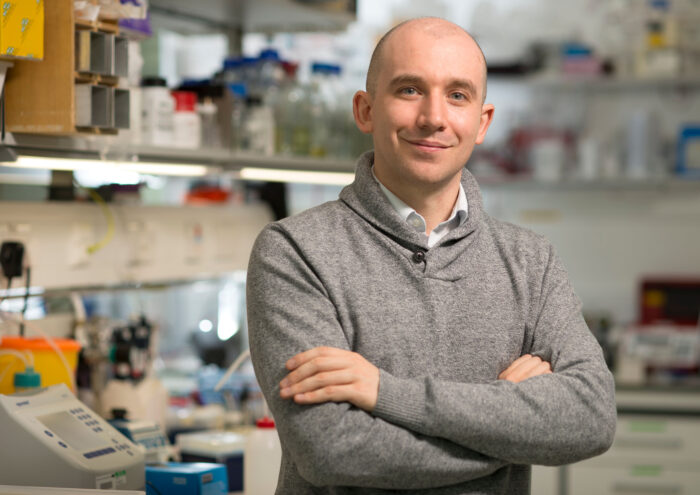
Emmanuel Derivery, Group Leader in the LMB’s Cell Biology Division, has been announced as the 2024 recipient of the Hooke Medal from the British Society for Cell Biology (BSCB) for his research investigating asymmetric cell division.
Emmanuel commented, “It’s a tremendous honour to receive this award, which is a tribute to the outstanding dedication of my team over the past years. As a microscopist, a medal celebrating the work of Robert Hooke designed by Brad Amos, two microscopy legends, feels very special”.
The BSCB awards the Hooke Medal annually to outstanding cell biologists based predominantly in the UK or Ireland who are within 14 years of starting their research groups. The award, first given in 2000, is named in honour of Robert Hooke, the 17th century natural philosopher and author of Micrographia, the first comprehensive, illustrated book on microscopy. Awardees are invited to deliver a lecture at the BSCB Annual Meeting and receive a medal designed by LMB emeritus scientist Brad Amos, depicting Robert Hooke’s microscope and the cork cells he described.
Emmanuel has been a Group Leader at the LMB since 2016. His research focus is asymmetric cell division, whereby the cellular contents of mother cells is distributed unequally between two daughter cells, allowing them to adopt different cell fates. This is the hallmark of stem cells, in which one daughter cell specialises to perform a specific function, while the other becomes another stem cell which retains the ability to divide. His group seeks to better understand the molecular mechanisms by which cell fate determinants segregate asymmetrically during this division.
Emmanuel’s group combines state-of-the-art, quantitative imaging in developing flies and mammalian cells with in vitro reconstruction using purified proteins, with an emphasis on technology development. Ultimately, they seek to determine how polarity signals are ‘written’ onto the mother cell’s cytoskeleton, and how these signals are in turn ‘read’ by molecular motors to carry cell fate determinants into only one daughter cells, allowing them to adopt different cell fates. In recent research, Emmanuel’s group in collaboration with the lab of David Baker in University of Washington, has developed a method based on de-novo protein design to directly untangle the contribution of signalling pathways involved in asymmetric cell division. In collaboration with John O’Neill’s group also in the LMB’s Cell Biology Division, discovered a mechanism by which cells ensure an optimal balance of water for biochemical reactions and protein function.
Prior to joining the LMB, Emmanuel was a Human Frontier Science Program postdoctoral fellow at the University of Geneva, Switzerland. He studied Molecular and Cell Biology at the ENS Lyon, France and received a Ph.D. from the University Paris-Sud, France.
Emmanuel is the fourth LMB Group Leader to win the Hooke Medal, following Andrew Carter, Anne Bertolotti and Ben Nichols.
Further references
Emmanuel’s group page
British Society for Cell Biology – 2024 Hooke Medal